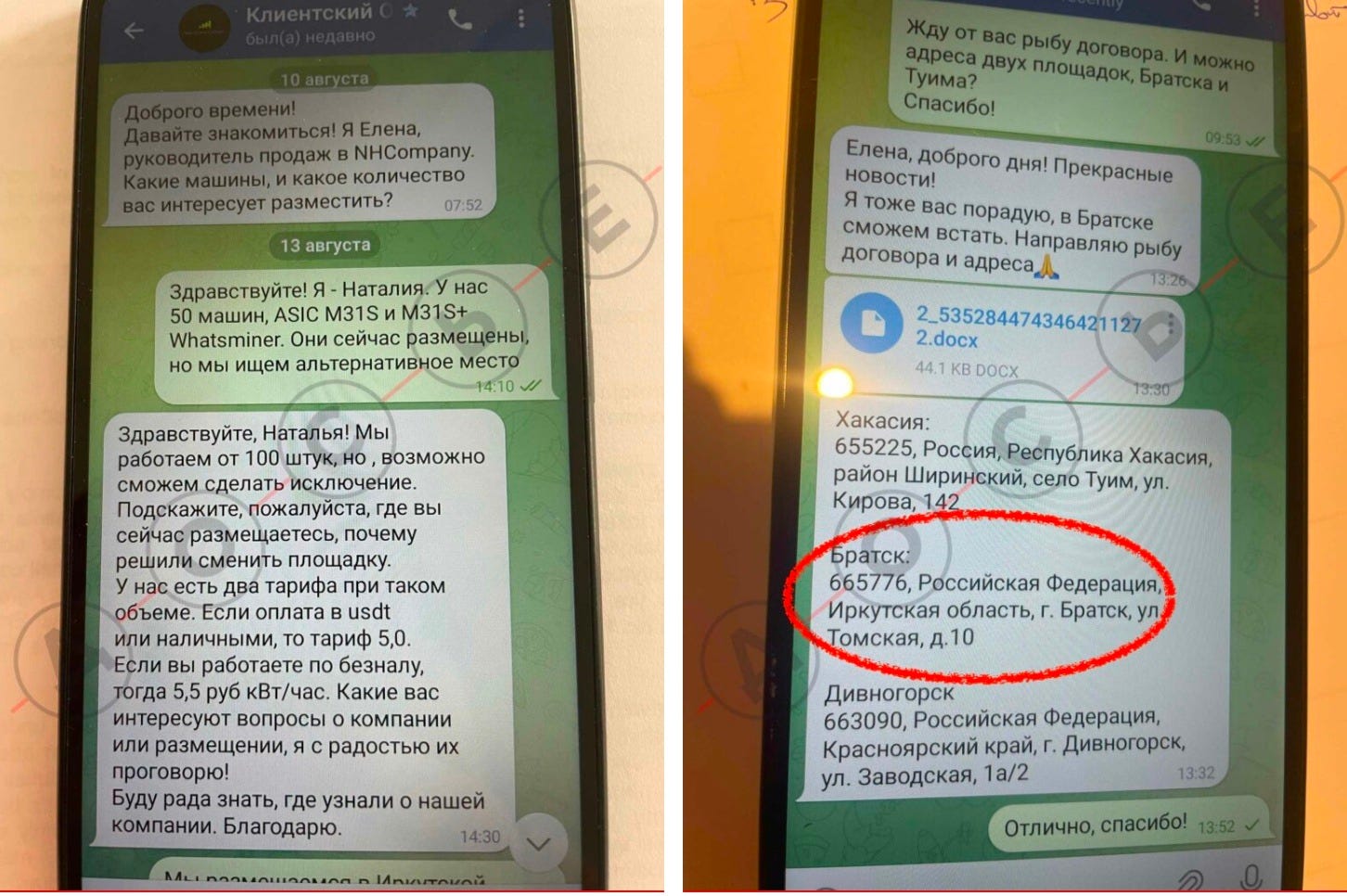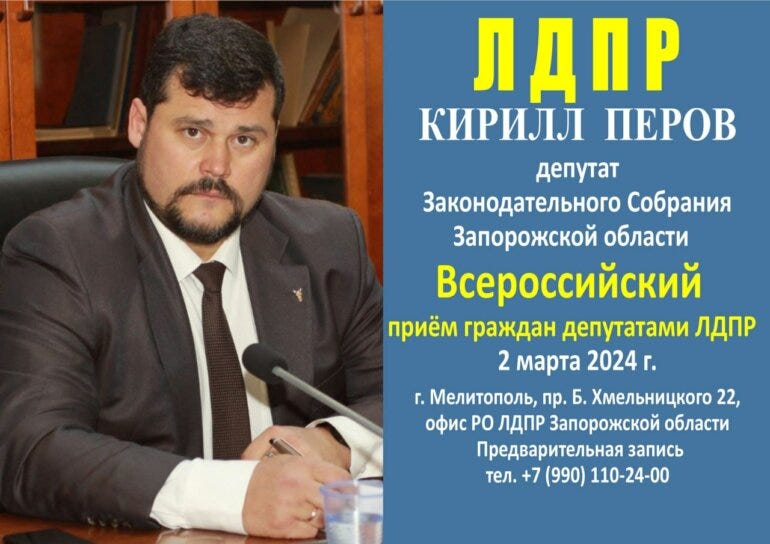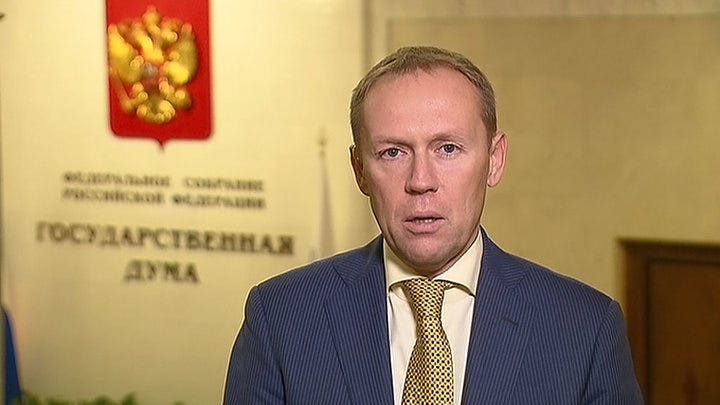Dossier Center Translation: We will install your ASICs
How MP Lugovoy is doing crypto business with a NATO army supplier
I occasionally do translations of investigations from various outlets that deserve a wider audience. Today, I’m posting an investigation by the Dossier Center on Andrei Lugovoy, a long-time member of Russia’s State Duma, infamous for his role in the 2006 polonium poisoning of Alexander Litvinenko. The Dossier Center’s investigation pulls back the curtain on a very different reality, revealing a man whose cynical business dealings and dubious connections span continents—and defy his nationalist rhetoric.
December 3, 2024
Translation of Dossier Center Investigation
Andrei Lugovoi has been sitting in the State Duma since 2007. He is famous for his participation in developing repressive laws, numerous denunciations, statements about the decaying West, and its "fosterlings." And, of course, the polonium poisoning of former FSB officer Alexander Litvinenko in London in 2006.
However, the Dossier Center managed to reveal a new side of Lugovoy. Behind the screen of a turbopatriot hides a cynical entrepreneur, absolutely unscrupulous in his connections. One of Lugovoy’s business partners is an Irish citizen, a NATO supplier. His plant sells equipment for fire guidance systems to the German army. Another is not only a business partner, but also a relative of Lugovoy’s, and sits in the occupation administration of the Zaporizhia region and delivers anti-drone guns to the Russian military. Companies associated with Lugovoy’s family conduct gray business, evade taxes, help transfer money out of Russia to circumvent sanctions, and probably steal electricity for their data center.
In between patriotic statements, deputy Lugovoy manages to lobby for his two main businesses: security and cryptocurrency.
"Of course, we'll install your ASICs. You can work with us officially - under a contract, by bank transfer. Or you can pay in cash. [In the second case] we'll draw up a contract, but pretend that there are no payments under it, no deal. And you'll bring cash twice a month to the office in Moscow City," a manager named Elena Simonenko explains to a Dossier Center correspondent how the data center works. The correspondent pretends to be a potential client who wants to install his Bitcoin mining machines there.
Earlier, Simonenko sent the address of the data center via messenger: Irkutsk region, Bratsk, Tomskaya Street, 10.
Officially, this place belongs to Bratskie Elektricheskie Seti (BES), an electricity supplier. From 2018 to 2024, the company's share was owned by Ksenia Alekseyevna Lugovaya, the wife of thr State Duma deputy. Now this share has been transferred to Andrei Agafonov, the assistant and business partner of the Lugov family.
The correspondent's conversation with Simonenko was recorded and is at the editorial office's disposal. In a country with normally functioning laws, the participation of a deputy's wife in an obviously grey business - with a forged contract and unaccounted payments - could already be grounds for resignation or even criminal prosecution.
However, BES is distinguished not only by its grey business.
Came out of nowhere and disappeared into the sunset
In the autumn of 2012, a lavish wedding was held in the Abrau-Dyurso nature reserve, not far from Putin's palace near Gelendzhik. The bride and groom were taken for a ride in a helicopter belonging to the business protection commissioner Boris Titov, and the guests were treated to Kuban dishes and ice-cold vodka from samovars. The 46-year-old State Duma deputy Andrei Lugovoi got married.
What is the deputy and businessman Andrey Lugovoy famous for?
Andrei Lugovoi was born in Baku to a military family and spent his childhood in Georgia. From 1983 to 1987 he studied at the Moscow Higher Combined Arms Command School, then served in the Kremlin Regiment, and after August 1991, in the 9th Directorate of the KGB, responsible for protecting the country's top officials. For example, Lugovoy accompanied acting Prime Minister Yegor Gaidar on a trip to the United States in 1992.
The deputy's chosen one was 23-year-old Ksenia Perova. In May 2007, the British authorities announced that they had collected enough evidence to accuse Andrei Lugovoi of poisoning Alexander Litvinenko. At that time, his future wife Ksenia was finishing school in her native Nakhodka. Later, the girl moved to her brother in Moscow, sold cell phones, studied at a university, worked as a waitress, hostess, and then as a manager in one of the Moscow restaurants - Andrei Lugovoi once came there for dinner, Ksenia recalls.
After the wedding, the woman took the stage name Kaya and became a singer. She now has about half a million subscribers on Instagram, which is banned in Russia, and 26,000 on YouTube. The latest video has gained almost seven million views – although Kaya took the chorus from the famous song by Sofia Rotaru.
The singer also became a co-owner of a number of companies - none of them had anything to do with show business, but almost all of them were connected with the family of Andrei Lugovoi. Thus, from 2013-2021, Ksenia owned the restaurant "Ded Pikhto" on Myasnitskaya Street in Moscow, which had previously been registered in the name of the deputy himself, his brother Yuri Lugovoi, his adopted daughter Tatyana, and his ex-wife Svetlana.
Ksenia got a truly big business — with a billion-dollar turnover — in 2018. She got a 20 percent share in Bratskie Elektricheskie Seti LLC, an electricity supplier in Bratsk. The deal looked quite formal: previously, a 25 percent share of BES was listed for Mikhail Ivanovich Sazonov, Lugovoi’s assistant, as Dossier noted. It is Mikhail Sazonov who writes odious requests and denunciations on behalf of the parliamentarian: for example, against former municipal deputy Yulia Galyamina. Such a paper was found in Lugovoi’s mail, which was hacked in 2023 by Ukrainian hackers. Sazonov is listed as the executor of the request to the prosecutor’s office on behalf of the deputy

In 2018, important events took place with BES itself. One of the largest data centers in the region appeared on the company's territory. For example, a correspondent from the English-language publication CoinDesk, one of the most authoritative in the crypto industry, was invited to inspect it as part of a kind of tour for potential clients in the summer of 2019. However, the publication noted that the data center was behind a blank concrete fence on the outskirts of the city without any signs or identification marks. It was possible to get into the territory only after calling a man named Ilya Bruman - he introduced himself as the CEO of the Minery project.
On the territory, where CoinDesk continued to operate, there were 26 metal containers with mining equipment. According to Bruman, this equipment belonged to clients from the U.S., Russia, Korea, India, Japan and Spain. The data center sold them its services - access to electricity and related infrastructure. A couple of days earlier, another batch of 550 ASICs arrived in Bratsk from a client in Korea. On the very first night, the machines produced half a bitcoin worth $5,000, Bruman bragged to the journalist. Other participants in the tour discussed how good the Siberian climate is for mining, and also thought about installing their equipment here.

“It was around 2018 when I first heard about this project, Minery. It was located in Bratsk, practically on the territory of an electrical substation, they had obvious connections with local electricians. Cheap and accessible electricity is a key condition for mining,” a source from the mining industry recalls in a conversation with Dossier. “This Minery was represented by two people: a certain Ilya Bruman and Alexey Paikin. They appeared out of nowhere: yesterday, no one had heard of such people, and today they say that they have one of the most powerful data centers in the Irkutsk region. But in principle, this is a normal story for our sector. No one really understood who these Paikin and Bruman were. It seems that the guys had connections: they arrived at some meetings in Moscow restaurants in a car with a privileged EKH number.”
The Dossier Center managed to establish what connections Alexey Paikin might have had. In 2018, he was 33 years old and owned only a few small firms in Moscow and Lyubertsy. But he was a relative of Boris Paikin, a State Duma deputy from the LDPR, one of the richest people in St. Petersburg, and a long-time associate of Andrey Lugovoy.
How we established family ties between Alexey Paikin from the Minery crypto project and LDPR deputy Boris Paikin
Alexey Mikhailovich Paikin was born in 1985 in Murmansk, graduated from school there, and now lives in Moscow, as can be seen from the databases. Mikhail Romanovich Paikin, born in 1962, was registered in the same apartment with him in Murmansk - apparently, his father. Paikin Sr. was born and now lives in St. Petersburg, he had his own architectural studio. The Dossier correspondent approached him under the guise of a potential client who needed repairs in her apartment. During the conversation, we casually asked whether deputy Boris Romanovich Paikin was a relative of Mikhail Romanovich
"In general, yes, these are family ties [with deputy Paikin]. But we don't communicate directly. It's just that when a person occupies a certain position in society, then, you know? Sometimes everyone else can look like poor relatives. I wouldn't want that. But in principle, yes. We even look alike, we used to look alike when I was bigger," architect Paikin answered our question at length, confirming his son's relationship with the LDPR deputy and Lugovoi's ally. Dossier has a recording of the conversation.
At first, Dossier's interlocutor from the crypto industry was quite familiar with the inner workings of the Minery business. According to him, settlements with contractors, for example for containers and various works, were handled by Minery Ru LLC. Also, electricity for the data center was purchased by Data Center Pravyi Bereg LLC. However, our interlocutor did not know who was ultimately behind these companies - except for Bruman and Paikin.
We managed to restore the full chain of legal entities and characters. The data center is located at 10 Tomskaya Street — on four plots of land. All of them are owned by Bratskie Elektricheskie Seti LLC, the lease is not registered with Rosreestr. There are ten transformer substations, low-voltage cables, and overhead power lines on the territory. All of this equipment also belongs to BES but is leased for ten years by Data Center Pravyi Bereg LLC. Ksenia Lugovaya owned a share in BES until March 2024, now almost a quarter of the company is owned by Andrey Agafonov, the family's business partner in five other companies, the rest is owned by Maxim Bannykh, a deputy of the Altai Territory, the son of Anatoly Bannykh, former Deputy Prime Minister of the Altai Republic who died in 2017. Until recently, DC Pravyi Bereg was controlled by three people: Ilya Bruman, Alexey Paykin, who we already know, and businessman Dmitry Simonenko, who will be discussed below.
The project under the Minery sign ended ingloriously. The company's website no longer works, the community page on VK is not updated, and the legal entity "Minery Ru" is in a state of bankruptcy. Ilya Bruman now talks about the role of Kabbalah in business, as if he had forgotten about the crypto project, to which he devoted almost an hour-long interview a couple of years ago.
"These guys, as often happens, screwed everyone and rode off into the sunset. They screwed the contractors, screwed those who gave them loans, and probably screwed some of the clients too. As I understand it, they are now pretending that they no longer have any connection to the data center in Bratsk. I know for sure that they owe money to many people," continues Dossier's source, who is well acquainted with the Minery project.
The bankruptcy procedure of the Minery Ru company was initiated by the Atiko company. The lawsuit states that it did not receive payment for its goods for almost 3 million rubles. Then, SC-Tolyatinsky Transformer LLC joined the lawsuit with a demand for 66 million rubles. In parallel, another lawsuit is underway against Minery Ru: the Kazakh company Atlas Technology Ka is demanding the seizure of about nine thousand ASICs, previously placed on the company's sites, from someone else's illegal possession. According to the plaintiff, at some point the site operator made an "arbitrary transfer of the settings of the placed equipment to its own crypto wallet." The court recently ruled to return the ASICs to the Kazakh owner.
Representatives of these companies, like Ilya Bruman, did not respond to inquiries from the Dossier Center.
Under a new sign
However, the data center in Bratsk is still operating and actively looking for new clients. True, this is being done under a new signboard - a certain New Hosting Company. Here's how we found out.
The company "DC Pravyi Bereg", which rents transformer substations and other "hardware", has a working website. It lists the phone number of the Moscow office. The answering machine advised to call Telegram at +7 968-780-00-90 to contact the customer service department. The girl who answered introduced herself as Elena Simonenko, manager of New Hosting Company. She installs clients' mining equipment in the data center in Bratsk at 10 Tomskaya Street - that is, in the data center associated with the Lugovayas.
The Dossier correspondent introduced herself as a potential client, the owner of mining machines. The manager said that there are two ways of working: "legally" and "grayly". In the first case, payments are made by bank transfer, that is, officially, through a bank account. In the second case, the client pays with USDT cryptocurrency or even in cash. Then the tariff is lower

During further conversations with the manager, other details emerged. The company's office is located in the Federation Tower in Moscow City, a famous lair of crypto-dealers. If you pay in cash, you need to bring it there. Such payments will not be accompanied by any papers, which means the seller is not going to pay taxes. Elena also said that the entire process is managed by a certain Dmitry Simonenko, her relative, according to her, "a business guru and the author of several books."
We have already met Dmitry Simonenko. Together with Bruman and Paikin, this man initially stood behind the companies Minery Ru and DC Pravyi Bereg, but unlike his partners, he never acted as the face of the project. And now, on the contrary, Simonenko actively attends crypto parties. "He is a newcomer to the crypto topic, this year he was promoting himself at meetups. He bragged that his turnover is billions," another participant in such meetings describes his impressions of Simonenko.
The crypto farm business in Bratsk is currently organized like this. Clients enter into a hosting agreement with Geo Energy LLC. This agreement is needed to draw up an acceptance certificate for the mining equipment, explains manager Elena. If the parties decide to work "under the table", that is, pay in cash, then no official payments are made under this agreement.
Clients of the data center in Bratsk can create a personal account on the website motherhash.io, Elena also told us. This website mentions the parent company of the entire business — Motherhash LLC from Georgia. This allowed Dossier to make an unexpected discovery: it turns out that the owner of the company, Dmitry Simonenko, has not only a Russian but also a valid Irish passport under the number LB3173457. The Georgian registry is so open that this information is available to anyone without any additional registrations.
NATO army supplier is a partner of the Lugovoy family
"By evening, the whole of Tverskaya was lined with prostitutes, like soldiers, every three meters, that is, in a row. It was mind-boggling," businessman Dmitry Simonenko describes his impressions of Moscow in 1997, when he returned to Russia after living in the United States for several years, in one of his few public appearances. America is blinkered, but in Moscow, like in the Wild West, you could feel the rapture of freedom.
While a student in the States, Simonenko sold used cars and then worked as an engineer building cellular infrastructure. After returning to Russia, he started a hosting company and worked on other IT projects. His largest business was a plant for the production of gyroscopes, devices used for navigation, launched in Ireland in 2011. Thanks to it, Simonenko even got a big article in the Russian Forbes. Gyroscopes were especially in demand among the military. Speaking to Forbes in 2015, the businessman hoped that by the end of the year, devices from his Innalabs plant would be used in most European tanks.
It was the plant that could have helped Simonenko obtain an Irish passport. The country has a program that allows businessmen who have invested more than 1 million euros in an Irish enterprise over three years to obtain a residence permit. To be naturalized, investors — like any other applicants for citizenship — must live in Ireland for at least five years, according to the program's rules.

The Innalabs factory in Dublin is still thriving today, still serving military needs. The company is on the official register of NATO suppliers. “Israeli missiles <…> fly on Innalabs navigation. All German ‘military equipment’ that has been produced over the past five years, all fire guidance and optics stabilization systems — too,” Simonenko said during a public speech in Moscow in 2022. The video was published on February 17 — a few days before the start of a full-scale war.
However, the war did not hinder business much either. Simonenko remained one of five directors of Innalabs until February 2024, as can be seen from the Irish business register. And until at least September 2023, he owned a minority stake - 3.4% of shares.
Simonenko, according to Dossier's source, began to actively appear at crypto parties in Moscow in February 2024, at the same time as leaving the Innalabs management. The businessman is promoting a data center in Bratsk, a project implemented jointly with Bratsk Electric Networks. In fact, this makes Simonenko a partner of the Lugovois in the crypto business. It turns out that Andrei Lugovoi himself is not embarrassed by the presence of a partner who recently managed and owned a plant servicing the NATO army.
Dmitry Simonenko, having read the Dossier questions sent to him on Telegram, blocked the correspondent.
Stolen electricity
The story of the Lugovs' crypto business lies not only in the moral and ethical plane but also in the criminal plane, Dossier found out. The fact is that the company "DC Pravy Bereg" apparently steals part of the electricity from "Bratskie Elektricheskie Seti" - and this cannot happen without the knowledge of BES themselves.
We were able to discover this thanks to two sources. The first, familiar with the Minery business, had heard about the electricity theft early on in the project. He advised us to access the company's bank statements to test this hypothesis. The second source provided us with these statements.
It is known that the capacity of the Bratsk data center is 10 megawatts, and it is “almost fully occupied [by miners],” manager Elena Simonenko told us. The tariff at which the enterprise purchased electricity in 2023 is 2.99–3.74 rubles with VAT, as can be seen from the information on the BES website. Consequently, during 2023, “DC Pravyi Bereg” should have transferred about 300 million rubles to BES for the supplied electricity, Dossier’s interlocutor calculated.
However, in the bank statement of DC Pravy Bereg, we found payments for electricity to BES for a different amount - 218 million rubles. These payments were made from the account of DC Pravy Bereg in Alfa-Bank to the account of BES in Raiffeisenbank. In other words, the difference between the actual electricity consumed and the paid amount is 80 million rubles.
"If a third of the supplied electricity is stolen, then this is a common story for the mining industry. Of course, the seller and the buyer are in collusion. The seller then writes off the unpaid electricity as so-called technological losses. These losses are compensated for by increasing tariffs for all consumers; in general, a wide range of people pay for the theft," explains a source of Dossier in the mining industry. "I personally heard other similar stories from the Irkutsk region. Electricians there suggest placing containers with mining machines right at the substations. And officially pay some minimum, and bring them the rest in cash at the rate of 1 ruble per kilowatt."
The Bratskie Elektricheskie Seti company did not respond to the Dossier Center’s request.

Pocket exchanger
Bratskie Elektricheskie Seti has its own crypto exchanger in Moscow City — a Dossier correspondent visited there under the guise of a client back in 2022. The office on the 65th floor of the Federation consisted of several rooms, in one of them a man was sitting at a small table, he counted the money brought on a typewriter, and then transferred cryptocurrency — USDT — to the correspondent’s account.
Has anything changed since 2022? Apparently not. According to a recent extract from Rosreestr, the crypto exchanger premises are owned by the company "City", where 25% belongs to Ksenia Lugova, and the rest belongs to BES partner Maxim Bannykh.
The exchanger is an important part of the BES business. As manager Elena Simonenko told us, some data center clients prefer to pay with cryptocurrency. Obviously, part of this crypto goes to BES owners. Their own exchanger allows you to cash it out profitably or withdraw money anywhere in the world, which is especially important for deputy Andrei Lugovoy, who is under numerous sanctions.
Overall, mining has become a good way for Russian businesses to bypass sanctions and withdraw funds.
"In general, the whole story about mining now is a story about cashing out or withdrawing. Let's say your company has a lot of non-cash, you want to turn it into cash without processing it as dividends, so as not to pay taxes. You buy mining equipment - by non-cash. You pay for hosting in a data center or on a crypto farm like Bratsky's, also by non-cash. The machines start producing bitcoins, bitcoins turn into USDT. And for USDT you will always get a suitcase of dollars - be it in Russia, or anywhere in the world, even in the USA. Therefore, even ordinary companies that have not previously been noticed in our industry are now installing mining equipment," says Dossier's interlocutor from the crypto industry.
Nimble brother
Ksenia Lugova has a brother, Kirill Perov. She moved to Moscow to live with him in 2007 after finishing school. Kirill helped his sister get a job as a mobile phone sales manager, Ksenia herself said.
At that time, Kirill owned a small company engaged in the car trade. But after his sister's marriage in 2012, his life changed dramatically. Soon he ran for mayor of Reutov from the LDPR, indicating his position: deputy general director of ChOO Devyaty Val - Security. This is a key company in the security empire of the Lugov family. He also worked in the Reutov administration, as can be seen from the leaked databases. And in 2023, Perov from the LDPR was elected to the legislative assembly of the occupied Zaporizhia region. Now other deputies "just look into Perov's mouth", and someone "turns pale and green in front of him", Ukrainian media claim. They call Perov an assistant to Deputy Lugov; their family relationship has not been publicly reported before.
The Lugovs' Security Empire
The Lugovoy family has been closely connected with the security business for over 20 years. The key company is "ChOO Devyaty Val - Security" with revenues of over 400 million rubles last year. One of the main clients is the Auchan chain; the company is currently looking for security guards for hypermarkets in Moscow and the Moscow region through its website, and also has letters of thanks from this chain. . Formally, the main owner of the company is Vladimir Valuev, Lugovoy's classmate from military school and a long-time business partner of his family. The company's mail gk9val@yandex.ru is used for personal purposes by Yuri Konstantinovich Lugovoy, the deputy's brother, as can be seen from the leaked databases.
Another important company is the Borey private security company. Yuri Konstantinovich Lugovoy and Andrey Agafonov, a business partner of the Lugovoy family, were officially employed there. The company's revenue for the past year was about 200 million rubles. The private security company recruited security guards, for example, through a VK page. A certain Alexey Avtsinov was listed as the contact. In phone books, he is listed as "DPR shift," “Borey Chop DPR LPR Educational Institutions," "Alexey Work Drn LPR Security." Avtsinov probably sends Borey employees to work on a rotational basis in the territories occupied by Russia - Donetsk and Luhansk.

Kirill Perov, on behalf of the LDPR foundation, delivers aid to Russian soldiers in the occupied territories. For example, he delivered anti-drone guns, copters, cars, generators, and other equipment to Genichesk. Igor Runets, the owner of the BitRiver group, the largest miner in Russia, was also listed among the consignors. And there is nothing surprising in this connection. Even before Genichesk, Perov and Runets were partners in the crypto business, Dossier found out.
In the summer of 2022, in the small town of Vikhorevka on the BAM in the Irkutsk region, the company "Data Center Vikhorevka" was registered, where 90% was owned by the company "Umdex," which is actually part of the BitRiver group, and 10% by Kirill Perov. "DC Vikhorevka" purchases electricity from the already familiar to us "Bratskie Elektricheskie Seti", in 2023 it paid them about 35 million rubles. On the official BitRiver website, "Vikhorevka" is mentioned as one of the group's data centers.
BitRiver probably partnered with Lugovoy's relative not only for the Vikhorevka project but also for lobbying purposes. Lugovoy is a member of various working groups related to cryptocurrency and gives interviews on the topic — all of this should be of interest to the largest Russian miner with a turnover of over 17 billion rubles.
What is BitRiver Group
The largest data center in the post-Soviet space — this is how Bloomberg described the first facility of the BitRiver group — appeared in Bratsk in 2018. The proximity to the Bratsk hydroelectric power station provided cheap electricity. The owner of the hydroelectric power station is Oleg Deripaska's En+ group. It was this oligarch that Bloomberg named as a possible hidden co-owner of BitRiver. Formally, the main owner of the business is entrepreneur Igor Runets from Yekaterinburg.
The group currently has more than 10 data centers across Russia, three of which are in the Irkutsk region. The total power consumption is more than 533 MW, making BitRiver one of the most powerful mining data center operators in the world. The group is under US sanctions. As the US Treasury wrote, energy resources and a cold climate give Russia a relative advantage in the mining industry, but imported computer equipment makes it vulnerable to sanctions.
Recently, Russia adopted the first law on mining in the industry's history. The BitRiver group actively participated in its preparation. For example, State Duma deputy Anton Gorelkin writes about this, and his words are confirmed by Dossier's interlocutor from the mining industry. Andrei Lugovoy is one of the authors of this law.
Behind the screen of a turbopatriot
"The war against Russia has entered a phase of open confrontation with everything Russian. For the West, power over the world is at stake <…>. A year ago, we passed a law on foreign agents - squeals began to come from everywhere, a flock of Western fosterlings got excited at our every move," Lugovoi's stream of consciousness flowed from the rostrum of the State Duma in July 2023.
Just a couple of months earlier, Lugovoy's wife was walking the streets of Paris, childishly happy that she had managed to get into a closed fashion boutique on her third try. The patriotic deputy's wife flew to France for a Beyoncé concert. She talks about all this on Instagram, which is banned in Russia—even though her husband was one of those who introduced repression against the social network.

Lugovoy’s adopted daughter Tatyana also loves the West, despite its opposition to everything Russian. She studied at the School of Hotel Management in the Swiss town of Caux, which she later fondly recalled on her Instagram. There, she admired the wonderful American holiday of Thanksgiving, and a couple of months before the start of Russia’s full-scale war against Ukraine, she assessed the design of the Louis Vuitton boutique in Miami.

However, there is nothing surprising in the love of Lugovoy's family members for Western countries. If you study the deputy's biography carefully, it becomes clear that Lugovoy is not a turbo-patriot at all, not a conservative with monstrous but sincere views. It's just that this man has been using the convenient screen of ultra-patriotism for many years to solve his own business issues.
Lugovoy has been a member of the State Duma since 2007 when he got there shortly after the successful operation to poison Alexander Litvinenko in London. At first, the deputy was not very active: during his entire first term, from 2007 to 2011, Lugovoy introduced only two bills. One of them proposed allowing Russian private security companies to operate abroad, which meant directly lobbying for the interests of the Lugovoy family's security business. However, the project was rejected as being contrary to international laws.
However, Lugovoy worked very productively in the next convocation — in 2011–2016. He participated in the development of 33 bills. As calculated by the Dossier Center, 9 of them were repressive or partially repressive in nature. For example, it was Lugovoy — together with three other deputies — who achieved the creation of a register of foreign agent organizations in 2014. It was also Lugovoy who was the sole author of the law that prohibited foreign organizations from researching television audiences in Russia.
The deputy was slightly more interested in the security business than in the repressions: another 11 bills were exclusively related to it. Thus, Lugovoi tried to prohibit departmental security from providing commercial services, that is, competing with private security companies. Or he proposed allowing municipalities to use private security companies instead of the police to maintain public order. All these amendments, of course, met the interests of the enterprises associated with him. However, practically none of these projects were ultimately adopted - most of them could not even pass the Duma lawyers because they contradicted the current legislation.
Poisoner on the third try
It is now common practice in the Russian elite to promote traditional and family values - as a counterweight to the decaying West. Lugovoy is also not averse to discussing this topic.
The MP really does like to spend time with his family. For example, when Lugovoi flew to London in 2006 to poison Alexander Litvinenko with polonium, he, despite the serious risks, took his entire family with him: his wife, two adopted daughters, and an eight-year-old son. This, for example, is mentioned in the official investigation presented in the British Parliament in 2016.
The investigation details November 1, 2006, the day Litvinenko was poisoned, almost minute by minute. Lugovoi and his family arrived the night before and checked into the Millenium Hotel. In the morning, the family went on a sightseeing tour of London, while Lugovoy and his friend Dmitry Kovtun went on some business (for example, they visited the office of a businessman they knew). They later returned to the hotel, and at about 4 p.m., Alexander Litvinenko arrived there. Lugovoy, Kovtun, and Litvinenko spent only half an hour together, with Litvinenko drinking some green tea from a teapot on the table. The meeting ended when Lugovoy’s family returned to the hotel from their tour. His wife and eight-year-old Yegor dropped into the bar, and Lugovoy walked his son to the table and insisted that he shake hands with “Uncle Sasha” [Litvinenko], the documents say, citing Litvinenko’s testimony given before his death. In the evening, Lugovoy and his family went to watch the CSKA-Arsenal football match, for which they allegedly flew to London, and Litvinenko suddenly felt ill.
Why did Lugovoy involve his family in this story? Two conclusions can be drawn from the official investigation. First, Lugovoy and his accomplices had a very poor understanding of the dangers of polonium and handled it extremely carelessly. For example, they poured a polonium-containing solution into a hotel sink, causing radioactive contamination. Second, November 1 was the third meeting in recent memory between Lugovoy and Litvinenko. Before that, Lugovoy had flown to London on October 16 and 25. Both times he met Litvinenko and both times he had access to polonium, a police investigation later showed. Perhaps the assassination attempt was supposed to have happened earlier, but for some reason, it failed. Therefore, Lugovoy was forced to act on November 1 - during a family trip, not a business trip.
This is what the inside of Andrey Lugovoy's business empire looks like. On the one hand, patriotic statements about traditional values and "Western fosterlings." On the other, a joint business with a NATO army supplier, a young wife who is unable to hide her love for Paris or at least stop posting on the banned Instagram, a business built on stealing electricity, and his son as a cover during his poisoning.
P.S. When this investigation was already ready, news appeared that Russian authorities were allegedly going to ban cryptocurrency mining in the Irkutsk region and some other regions. Even the supposed date was named - December 1. However, at the time of publication of this material, the ban had not yet come into effect.
Natalia Telegina











